Poetry for Today—and Every Day
Who are today's best and brightest new poets? We asked the poetry lovers at the National Book Critics Circle to weigh in.
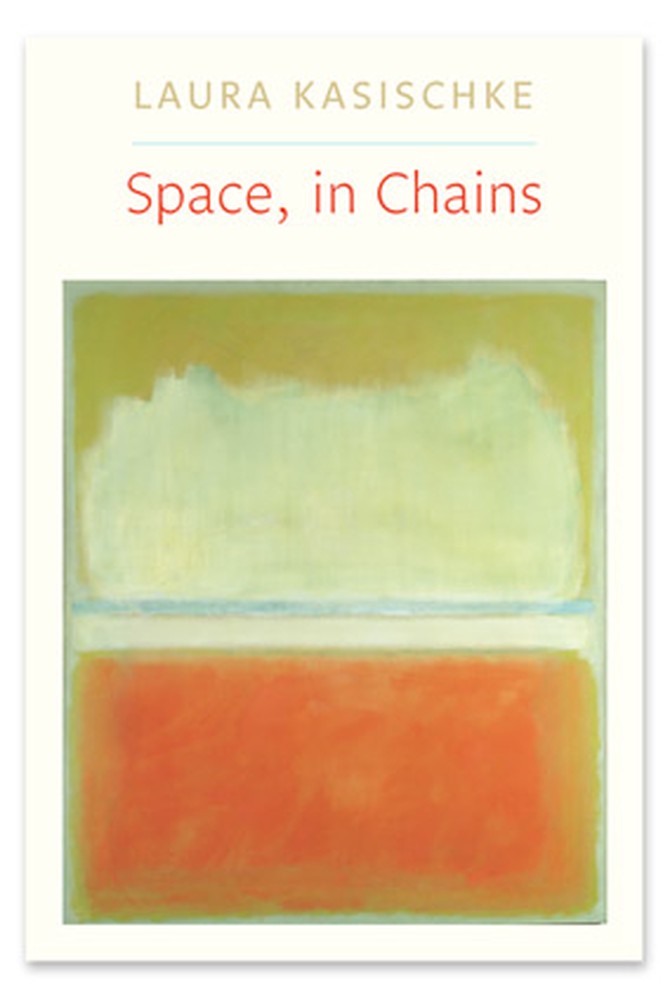
Space in Chains
By Laura Kasischke
Copper Canyon Press
"the chaos of birdsong after a rainstorm, the steam rising off the asphalt, a small boy in boots opening the back door, stepping out, and someone calling to him from the kitchen..."
Time crawls in a hospital, repeats itself at the office, races past children as they grow from one year to the next, halts at a funeral, flies when you're having fun: Any writer who wants to describe a life in full must attend not only to what we do, who we know, how we feel, but also to how time feels as we do it.
Laura Kasischke is one of very few poets whose style now seems equal to that task. No poet alive has worked harder to depict the contemporary American life course: She has shown herself, in sharply vivid poems, as a girl, as a wayward teen, as a young adult, as a passionate and worried mother with a baby, a child, and now a teenaged son, and especially, in this eighth book of her poems, as an adult daughter whose parents fall ill, part of the so-called sandwich generation. And no poet now at work does better than Kasischke in finding ways to depict not just how we feel about life stages and the people in them but also how we change as those stages go by.
The story of her father's decline, and her reactions to it, resonate through the book from "My father asleep in a chair in a warm corridor.... While his boat, The Unsinkable, sails on, and sails on." It is a story as clearly told, in pieces, as you might expect from a successful novelist (two of Kasischke's novels are now films), but it is not a story that takes over the book. In fact (a persistent fact about Kasischke's poetry) no single story controls even a single poem. Our lives are too strange, too inwardly wild, too outwardly unpredictable for that. Instead, the poet presents herself as angry, nostalgic, skeptical, pious, distraught, glad and helpless by turns. How to feel—how to articulate a single feeling—about this sort of event?
—Stephen Burt
For the complete text of this article, see the National Book Critic's Circle blog, The Critical Mass.
By Laura Kasischke
Copper Canyon Press
"the chaos of birdsong after a rainstorm, the steam rising off the asphalt, a small boy in boots opening the back door, stepping out, and someone calling to him from the kitchen..."
Time crawls in a hospital, repeats itself at the office, races past children as they grow from one year to the next, halts at a funeral, flies when you're having fun: Any writer who wants to describe a life in full must attend not only to what we do, who we know, how we feel, but also to how time feels as we do it.
Laura Kasischke is one of very few poets whose style now seems equal to that task. No poet alive has worked harder to depict the contemporary American life course: She has shown herself, in sharply vivid poems, as a girl, as a wayward teen, as a young adult, as a passionate and worried mother with a baby, a child, and now a teenaged son, and especially, in this eighth book of her poems, as an adult daughter whose parents fall ill, part of the so-called sandwich generation. And no poet now at work does better than Kasischke in finding ways to depict not just how we feel about life stages and the people in them but also how we change as those stages go by.
The story of her father's decline, and her reactions to it, resonate through the book from "My father asleep in a chair in a warm corridor.... While his boat, The Unsinkable, sails on, and sails on." It is a story as clearly told, in pieces, as you might expect from a successful novelist (two of Kasischke's novels are now films), but it is not a story that takes over the book. In fact (a persistent fact about Kasischke's poetry) no single story controls even a single poem. Our lives are too strange, too inwardly wild, too outwardly unpredictable for that. Instead, the poet presents herself as angry, nostalgic, skeptical, pious, distraught, glad and helpless by turns. How to feel—how to articulate a single feeling—about this sort of event?
—Stephen Burt
For the complete text of this article, see the National Book Critic's Circle blog, The Critical Mass.
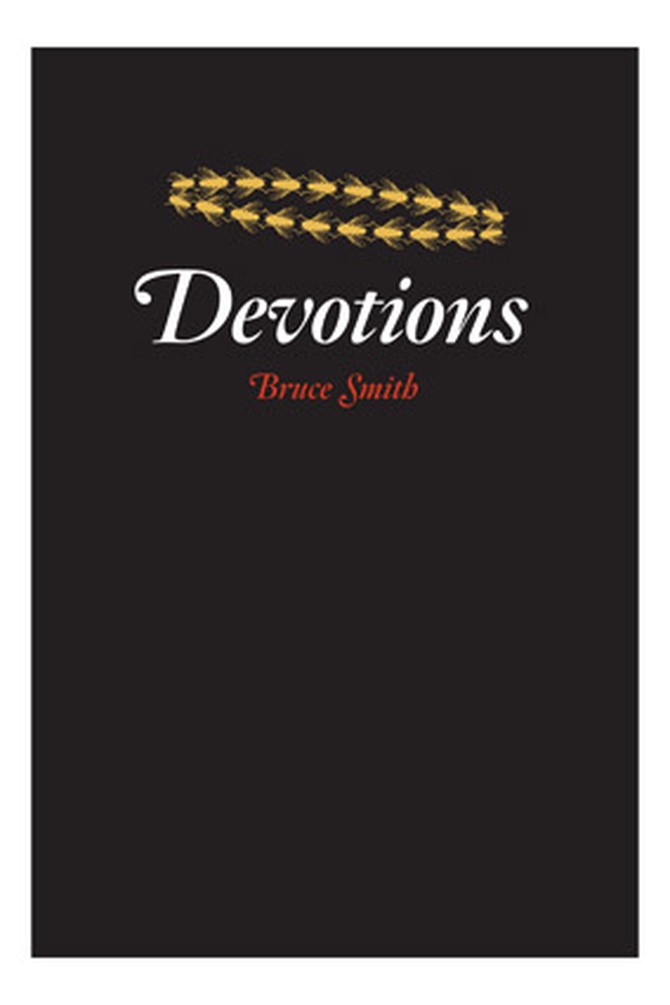
Devotions
By Bruce Smith
Phoenix Poets
"We know so much. We know a glance is the romance of the optic nerve, and a blow at an angle so that we keep on going."
To read Bruce Smith's Devotions is to enter the unsettled crossroads of contemporary American poetry. It's a place where pop meets the classical, where the spiritual text meets LOL, where Paolo and Francesca might road-trip from Corpus Christi to St. Paul with overnight romps in the hay at the Red Roof Inn.
Devotions pulls together some 60 poems—called devotions—on all manner of Americana, from the shopping malls to the jazz clubs, from the gritty to the prissy, from Providence to the unbidden. Only a poetry of reverie could unite the "ravishment, affliction, fraudulence, magnificence, anguish [and] argument" that is the hodge-podge mishmash of this nation. It accomplishes what so little American poetry does today, even attempts today: It envelops you in a singular imagined universe of rhythm and logic.
—David Biespiel
For the complete text of this article, see the National Book Critic's Circle blog, The Critical Mass.
By Bruce Smith
Phoenix Poets
"We know so much. We know a glance is the romance of the optic nerve, and a blow at an angle so that we keep on going."
To read Bruce Smith's Devotions is to enter the unsettled crossroads of contemporary American poetry. It's a place where pop meets the classical, where the spiritual text meets LOL, where Paolo and Francesca might road-trip from Corpus Christi to St. Paul with overnight romps in the hay at the Red Roof Inn.
Devotions pulls together some 60 poems—called devotions—on all manner of Americana, from the shopping malls to the jazz clubs, from the gritty to the prissy, from Providence to the unbidden. Only a poetry of reverie could unite the "ravishment, affliction, fraudulence, magnificence, anguish [and] argument" that is the hodge-podge mishmash of this nation. It accomplishes what so little American poetry does today, even attempts today: It envelops you in a singular imagined universe of rhythm and logic.
—David Biespiel
For the complete text of this article, see the National Book Critic's Circle blog, The Critical Mass.
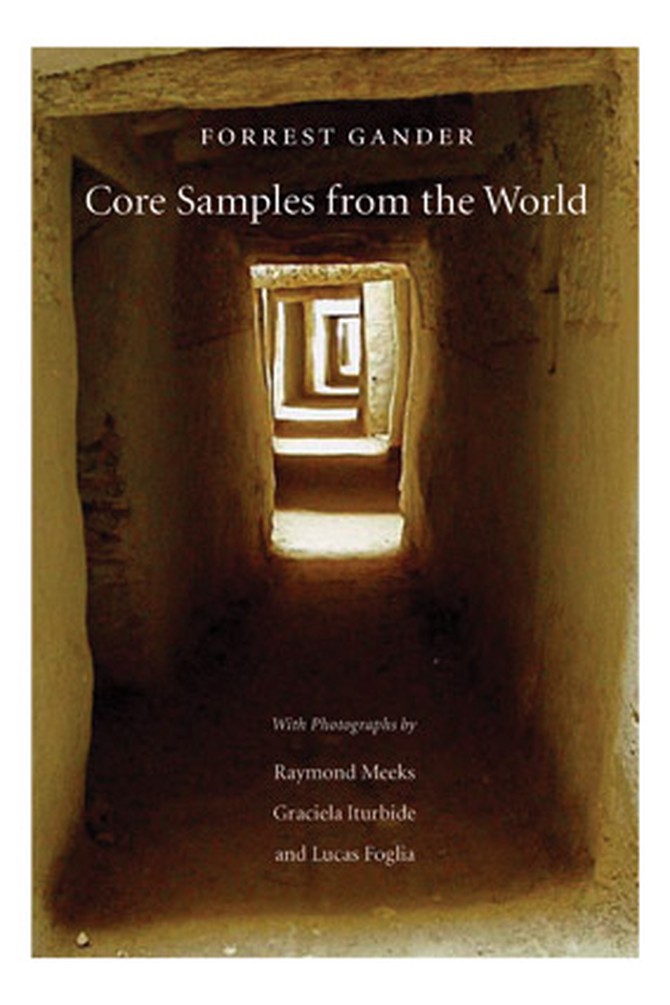
Core Samples from the World
By Forrest Gander
New Directions
"Just beyond, the road clears the jungle. Wind-blown sands scarf the road. We can't begin to track the changes that bring us here."
Forrest Gander's Core Samples from the World is an unusual book even for poetry, a genre that frequently breaks many book-world rules. Gander's poetry and prose is sequenced beside black-and-white photos by three photographers: Raymond Meeks, Graciela Inturbide and Lucas Foglia. Certainly the words and pictures work together, but it's not as simple as the poems describing the pictures or the pictures inspiring the poems. No, there's something much more poetic going on.
It's as though the images and poems get on each other, the way a dash of some ingredient might accidentally spill into a mixing bowl and suddenly the unsuspecting chef is making a delicacy. In a poem beside a Meeks photo of two dust-covered boys carrying baskets on their heads, one up front and in focus, the other blurry in the background, Gander writes of "The sense of epoch loosened, unstrung. Each one thinking it is the other who recedes like a horizon." Facing an Iturbide photo of what look like rows of cacti, we read a dialogue about tending sheep in France: "They have sheep? Sure. How many might one shepherd have? I don't know, thousands. How could they be counted?"
Gander has always been an innovative poet, and one deeply concerned with the events, and languages, beyond America's borders. In this, certainly his most accessible and possibly his most powerful book, he brings the world's frightening and beautiful strangeness far beyond the edge of the page
—Craig Morgan Teicher
For the complete text of this article, see the National Book Critic's Circle's blog, The Critical Mass.
By Forrest Gander
New Directions
"Just beyond, the road clears the jungle. Wind-blown sands scarf the road. We can't begin to track the changes that bring us here."
Forrest Gander's Core Samples from the World is an unusual book even for poetry, a genre that frequently breaks many book-world rules. Gander's poetry and prose is sequenced beside black-and-white photos by three photographers: Raymond Meeks, Graciela Inturbide and Lucas Foglia. Certainly the words and pictures work together, but it's not as simple as the poems describing the pictures or the pictures inspiring the poems. No, there's something much more poetic going on.
It's as though the images and poems get on each other, the way a dash of some ingredient might accidentally spill into a mixing bowl and suddenly the unsuspecting chef is making a delicacy. In a poem beside a Meeks photo of two dust-covered boys carrying baskets on their heads, one up front and in focus, the other blurry in the background, Gander writes of "The sense of epoch loosened, unstrung. Each one thinking it is the other who recedes like a horizon." Facing an Iturbide photo of what look like rows of cacti, we read a dialogue about tending sheep in France: "They have sheep? Sure. How many might one shepherd have? I don't know, thousands. How could they be counted?"
Gander has always been an innovative poet, and one deeply concerned with the events, and languages, beyond America's borders. In this, certainly his most accessible and possibly his most powerful book, he brings the world's frightening and beautiful strangeness far beyond the edge of the page
—Craig Morgan Teicher
For the complete text of this article, see the National Book Critic's Circle's blog, The Critical Mass.
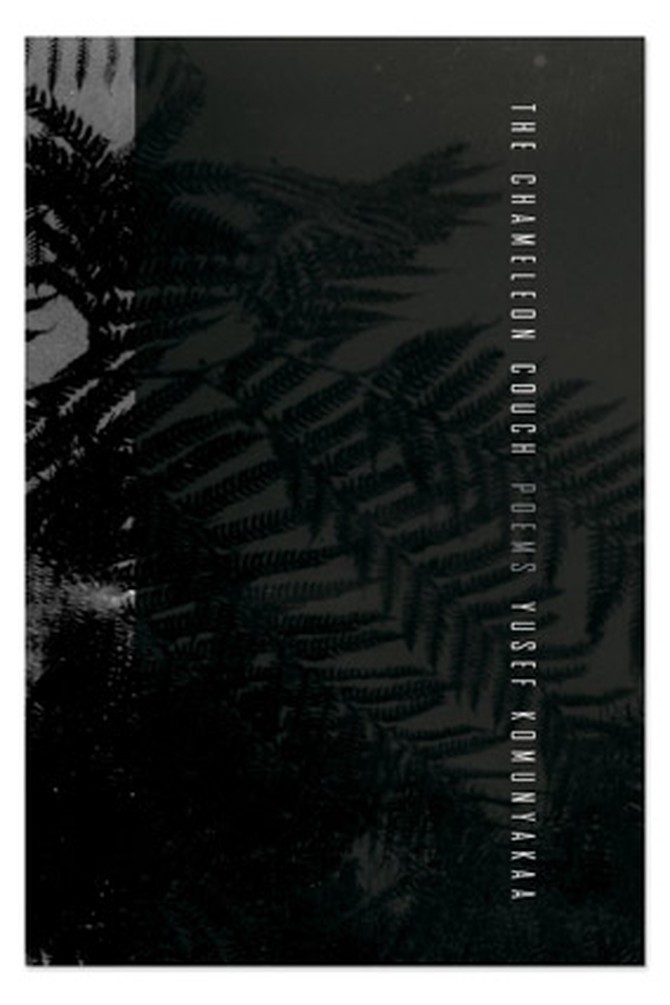
The Chameleon Couch
By Yusef Komunyakaa
Farrar, Straus and Giroux
"I may have learned to articulate the silence of silk falling, but I cannot teach my shadow to stop limping three paces behind when I take a bow..."
In The Chameleon Couch, there does not seem to be a road Komunyakaa's mind hasn't traveled. The poems in this collection encompass a global and historical expanse, from antiquity to the present, from Europe to Asia.
Growing up in small-town Louisiana, Komunyakaa experienced the lush multilingual, multi-dialect grate and grind of the English language. His poems in The Chameleon Couch, like his earlier poetry, exude this Creole of common speech. He hears the cadences of the slave, of the aesthete, of the child, the matron and the master. All voices are rendered in a music not expressed in the English language since Yeats and Tennyson and Browning. But there's more to Komunyakaa than just beauty of linguistic delivery. Komunyakaa is a poet of language and ideas, something we yearn for. He writes, "We dream of going from one desire to the next. But in the final analysis a good thought is the simplest food."
There's plenty of food in The Chameleon Couch, a book as wise as any we've seen in recent years in America. Global, thoughtful, philosophical, political, personal, responsible, it is a noble addition to the oeuvre of one of the greatest living American Poets
—Eric Miles Williamson
For the complete text of this article, see the National Book Critic's Circle blog, The Critical Mass.
By Yusef Komunyakaa
Farrar, Straus and Giroux
"I may have learned to articulate the silence of silk falling, but I cannot teach my shadow to stop limping three paces behind when I take a bow..."
In The Chameleon Couch, there does not seem to be a road Komunyakaa's mind hasn't traveled. The poems in this collection encompass a global and historical expanse, from antiquity to the present, from Europe to Asia.
Growing up in small-town Louisiana, Komunyakaa experienced the lush multilingual, multi-dialect grate and grind of the English language. His poems in The Chameleon Couch, like his earlier poetry, exude this Creole of common speech. He hears the cadences of the slave, of the aesthete, of the child, the matron and the master. All voices are rendered in a music not expressed in the English language since Yeats and Tennyson and Browning. But there's more to Komunyakaa than just beauty of linguistic delivery. Komunyakaa is a poet of language and ideas, something we yearn for. He writes, "We dream of going from one desire to the next. But in the final analysis a good thought is the simplest food."
There's plenty of food in The Chameleon Couch, a book as wise as any we've seen in recent years in America. Global, thoughtful, philosophical, political, personal, responsible, it is a noble addition to the oeuvre of one of the greatest living American Poets
—Eric Miles Williamson
For the complete text of this article, see the National Book Critic's Circle blog, The Critical Mass.
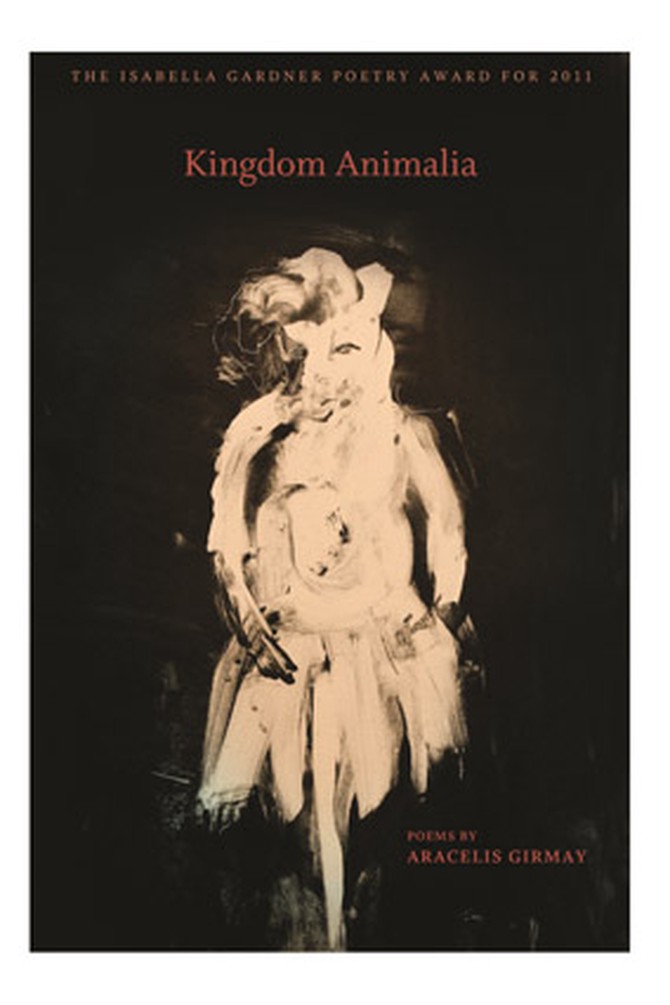
Kingdom Animalia
By Aracelis Girmay
BOA Editions, Ltd.
"Trust we'll know your shape, whatever species in you answers when we put our faces to the dirt & call you by your old & human name."
In this book, Girmay connects with siblings, parents and ancestors, often bringing them back to life or discovering them in another. Early on, she asks, "What to do with this knowledge, that our living is not guaranteed?"
But Kingdom is also about loss and changing. In "Dear Minnie, Dear Ms." dedicated to the songbird Minnie Riperton and to the poet Lucille Clifton, Girmay imagines both women after death: "Trust the mud is you, & the soft, silver afro of the dandelion. Trust the grass-whistle might be your speech, high as the whistle of the whale. Trust we'll know your shape, whatever species in your answers when we put our faces to the dirt & call you by your old & human name." In "Noche de Lluvia, San Salvador" raindrops fall off the page singing, "sí sí sí sí sí sí." In "La boda del Mar y Arena," the poet writes, "The sea & beach move into each other's mouths, particle by particle; each one wanders the big rooms of the other. O, god, let us love like they love."
There is a saying in Spanish, "Cada cabeza es un mundo," which translates "every mind is a universe unto itself." And Girmay's world, universe, opens new ways of seeing the simplest things and giving them voice. Everything contains some clue of another self, body or kindred spirit. Like an archeologist, she digs deeply finding herself in every living thing, even in the inanimate. Her magic is poetry at its best.
—Gregg Barrios
For the complete text of this article, see the National Book Critic's Circle blog, The Critical Mass.
More Poetry to Enjoy
By Aracelis Girmay
BOA Editions, Ltd.
"Trust we'll know your shape, whatever species in you answers when we put our faces to the dirt & call you by your old & human name."
In this book, Girmay connects with siblings, parents and ancestors, often bringing them back to life or discovering them in another. Early on, she asks, "What to do with this knowledge, that our living is not guaranteed?"
But Kingdom is also about loss and changing. In "Dear Minnie, Dear Ms." dedicated to the songbird Minnie Riperton and to the poet Lucille Clifton, Girmay imagines both women after death: "Trust the mud is you, & the soft, silver afro of the dandelion. Trust the grass-whistle might be your speech, high as the whistle of the whale. Trust we'll know your shape, whatever species in your answers when we put our faces to the dirt & call you by your old & human name." In "Noche de Lluvia, San Salvador" raindrops fall off the page singing, "sí sí sí sí sí sí." In "La boda del Mar y Arena," the poet writes, "The sea & beach move into each other's mouths, particle by particle; each one wanders the big rooms of the other. O, god, let us love like they love."
There is a saying in Spanish, "Cada cabeza es un mundo," which translates "every mind is a universe unto itself." And Girmay's world, universe, opens new ways of seeing the simplest things and giving them voice. Everything contains some clue of another self, body or kindred spirit. Like an archeologist, she digs deeply finding herself in every living thing, even in the inanimate. Her magic is poetry at its best.
—Gregg Barrios
For the complete text of this article, see the National Book Critic's Circle blog, The Critical Mass.
More Poetry to Enjoy
Published 03/05/2012

